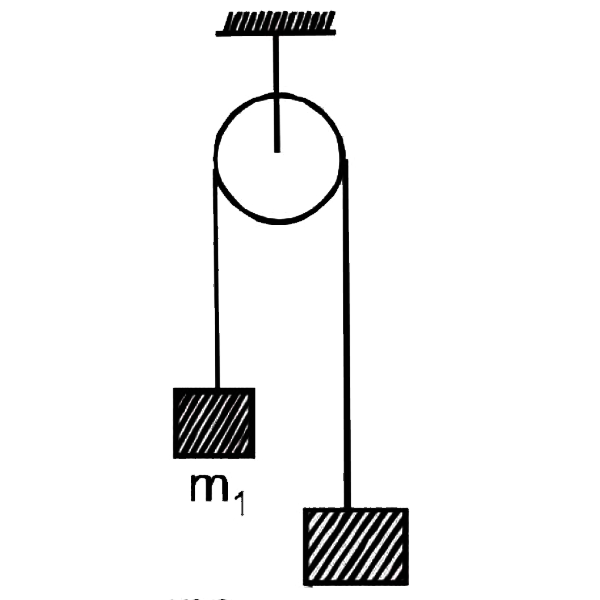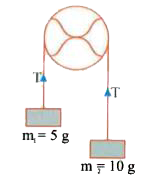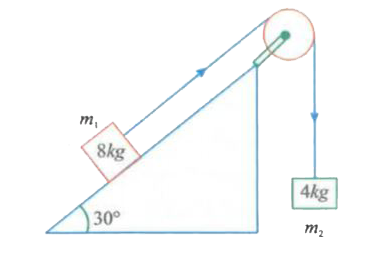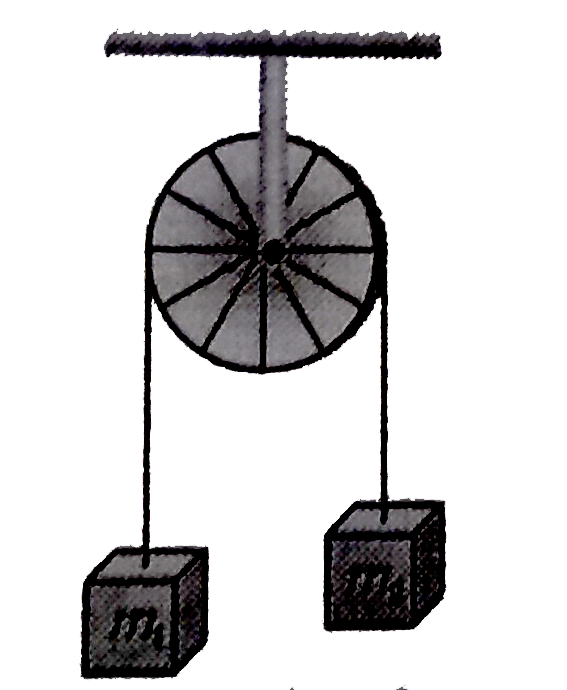Two masses m1=5kg and m2=4.8kg tied to a string are hanging over a light frictionless pulley. What is the acceleration of the masses when left free to move ? (g=9.8m/s2):

0.2m/s2
9.8m/s2
5m/s2
4.8m/s2
The correct Answer is:a
Here a=M−mM+m.g
M>m
a=m1−m2m1+m2.g=5−4.85+4.8×9.8=0.2ms−2
Hence choice is (a).
Topper's Solved these Questions
- LAWS OF MOTIONBOOK - MODERN PUBLICATIONCHAPTER - LAWS OF MOTIONEXERCISE - MULTIPLE CHOICE QUESTION (LEVEL-II)
64 Videos
- LAWS OF MOTIONBOOK - MODERN PUBLICATIONCHAPTER - LAWS OF MOTIONEXERCISE - MULTIPLE CHOICE QUESTION (LEVEL-III)
2 Videos
- HEAT AND THERMODYNAMICSBOOK - MODERN PUBLICATIONCHAPTER - HEAT AND THERMODYNAMICSEXERCISE - Recent Competitve Questions
17 Videos
- MAGNETOSTATICSBOOK - MODERN PUBLICATIONCHAPTER - MAGNETOSTATICSEXERCISE - RECENT COMPETITIVE QUESTION
5 Videos
Similar Questions
Two masses m1=5kg and m2=4.8kg tied to a string are hanging over a light frictionless pulley. What is the acceleration of the masses when left free to move?

View SolutionTwo blocks m1 = 5 g and m2= 10 g are hung vertically over a light frictionless pulley as shown in figure. What is the acceleration of the masses when left free ?

View Solution
Knowledge Check
Two masses m1=5kg and m2=4.8kg tied to a string are hanging over a light frictionless pulley. What is the acceleration of the masses when left free to move?
 A(a) 5m/s2B(b) 9.8m/s2C(c) 0.2m/s2D(d) 4.8m/s2
A(a) 5m/s2B(b) 9.8m/s2C(c) 0.2m/s2D(d) 4.8m/s2Two masses of 8 kg and 4 kg are connected by a string as shown in figure over a frictionless pulley. The acceleration of the system is
 A4m/s2B2m/s2CzeroD9.8m/s2
A4m/s2B2m/s2CzeroD9.8m/s2Two masses m1 and m2 are attached to a string which passes over a frictionless smooth pulley. When m1=10kg,m2=6kg, the acceleration of masses is
 A20m/s2B5m/s2C2.5m/s2D10m/s2
A20m/s2B5m/s2C2.5m/s2D10m/s2
Two blocks of masses 2 kg and 4 kg tied to a string passing over a frictionless pulley. What will be the magnitude of acceleration of the masses, when they are allowed to move freely?
View SolutionTwo blocks of masses 2 kg and 4 kg tied to a string passing over a frictionless pulley. What will be the magnitude of acceleration of the masses, when they are allowed to move freely?
View SolutionTwo blocks of masses 2 kg and 4kg tied to a spring passing over a frictionless pulley . What will br the magnitude of acceleration of the masses, when they are allowed to move freely ?
View SolutionTwo masses of 8kg and 4kg are connected by a string as shown in figure over a frictionless pulley.The acceleration of the system is

View SolutionTwo bodies of massless string passing over a frictionless pulley. The acceleration of the system is (g=9.8m/s2)
View Solution
